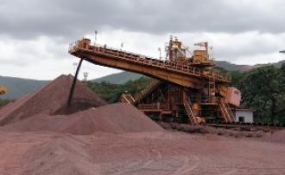THE DOMESTICATION OF INTERNATIONAL AND REGIONAL INITIATIVES IN THE
MINING SECTOR POLICIES, LAWS AND PROGRAMMES OF ACTIONS BY MEMBER COUNTRIES OF
THE ECONOMIC COMMUNITY OF WEST AFRICAN STATES (ECOWAS) WAS AT THE CENTER OF
DISCUSSIONS IN THE FRAMEWORK OF A "HIGH-LEVEL DIALOGUE ON HARMONIZED
POLICIES FOR NATURAL RESOURCE MANAGEMENT IN THE ECOWAS ZONE". THIS
TECHNICAL MEETING WHICH GATHERED THIRTY EXPERTS INCLUDING PARLIAMENTARIANS
ORIGINATING FROM WEST AFRICA, PAN-AFRICAN INSTITUTIONS AND ORGANIZATIONS WORKING
IN THIS SECTOR, WAS HELD ON OCTOBER 6-7, 2015 IN DAKAR, AT THE AFRICAN
INSTITUTE FOR ECONOMIC DEVELOPMENT AND PLANNING (IDEP).
Organized
by the ECA through its Sub-Regional Office for West Africa in collaboration
with IDEP, the Extractive Industries Transparency Initiative (EITI) of Senegal,
the ECA Capacity Development Division (CDD) and the African Minerals
Development Centre (AMDC) with the coordination of the Government of Senegal,
this meeting draws its essence from the willingness and ambition of the ECA to
contribute to the effective implementation of regional initiatives in terms of
the development of the natural resources sector in general and in particular in
mines and petroleum sectors of the ECOWAS Member states. From the different
existing initiatives, the meeting focused essentially on the African Mining
Vision (AMV) of the African Union Commission, the Extractive Industries
Transparency Initiative (EITI) and the ECOWAS Directives.
It was
chaired by the Senegalese Minister of Industry and Mines, Mr. Aly Ngouille
N'diaye who, in his opening speech expressed, on behalf of the Government of
his country, all his gratitude and encouragement to the ECA "for all the
efforts deployed to make the 21st century the ultimate era for the acceleration
and completion of the structural transformation of our economies, notably
through industrialization, the development of infrastructure, economic
diversification and effective regional integration".
Beforehand,
two welcome addresses were delivered by His Excellency Mr. Ismailla Madior
FALL, Minister Advisor to the President of the Republic of Senegal, President
of the National EITI Committee-Senegal and by Mrs. Karima Bounemra Ben Soltane,
Director of IDEP, who thanked the Government of the Republic of Senegal for
accepting to host the meeting before, highlighting its importance for West
Africa countries.
The
discussions were conducted through three sessions: (i) Information session on
regional development initiatives of the mining sector in West Africa, notably
on the AMV, the EITI and the problems of negotiating mining contracts in
Africa; (ii) Session on the results of the ECA study on the "effective
implementation of the AMV, the ECOWAS Directives and the EITI Norm in West
Africa" and (iii) interventions of countries on the domestication of
regional initiatives in mining development: National Experiences and Best
Practices.
The
presentations complemented by the group works enabled the experts to deepen the
discussions on the difficulties and challenges in the domestication of the
principles, orientations, norms and requirements of the AMV, the EITI and the
ECOWAS Directives at national level. They are related to: National practices
for the development of the mining sector often exogenous, based on foreign
expertise and providing little space for local and sub-regional investors and
experts; asymmetric information and expertise among States, investors and other
local actors, which fragilizes the positions of States in the negotiations of
mining contracts; a multitude of frameworks for the promotion of the
development of mining sectors in countries and enormous needs in terms of
harmonization and mutualization of operations in this field.
On the
basis of the difficulties and challenges raised, the participants formulated
recommendations to enrich the study report and strengthen the domestication of
the AMV, the EITI and the ECOWAS Directives for Member States. These include
the following:
(i)
Strengthen and consolidate the project to harmonize policies and mining codes
in a context where the sub-region has the same mining resources and faces the
same multinationals,
(ii) Develop geological engineering expertise, along with
the financial, economic and legal expertise of States for an appropriation of
reforms and the promotion of multi-disciplinary endogenous teams that could
accompany States in their negotiations of mining contracts and contribute to
the improvement of the knowledge of local actors on the available resources in
the country from the qualitative and quantitative point of view;
(iii) Make an
inventory of best practices on the domestication of sub-regional mining
initiatives and encourage their adoption and diffusion, (iv) Promote the
partnership between the African Minerals Development Centre (AMDC) and the
ECOWAS states on the mining sector in order to benefit from the expertise of
this center.
Published by:
The Sub-Regional Office for
West Africa of the ECA (ECA/SRO-WA)
P.O. Box 744/ BP 744
Niamey, Niger
Tel.: +227 20 72 73 24/20 72 29 61,
Fax: +227 20722894;
E-mail: srdcwest@uneca.org
Site web: http://www.uneca.org/fr/sro-wa
CONTENT SOURCE: allafrica

Comments